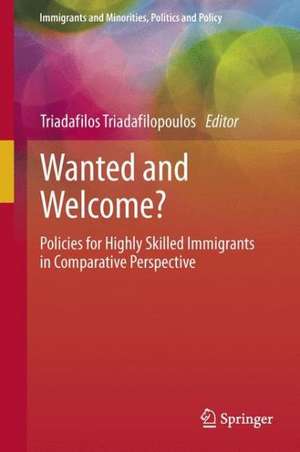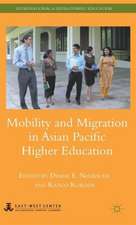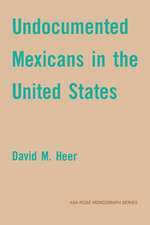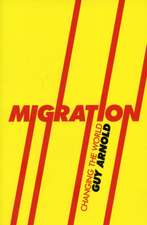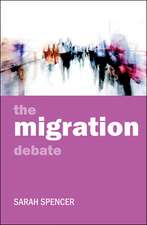Wanted and Welcome?: Policies for Highly Skilled Immigrants in Comparative Perspective: Immigrants and Minorities, Politics and Policy
Editat de Triadafilos Triadafilopoulosen Limba Engleză Hardback – 26 mar 2013
| Toate formatele și edițiile | Preț | Express |
|---|---|---|
| Paperback (1) | 782.24 lei 43-57 zile | |
| Springer – 14 apr 2015 | 782.24 lei 43-57 zile | |
| Hardback (1) | 646.62 lei 43-57 zile | |
| Springer – 26 mar 2013 | 646.62 lei 43-57 zile |
Preț: 646.62 lei
Preț vechi: 760.73 lei
-15% Nou
Puncte Express: 970
Preț estimativ în valută:
123.75€ • 128.86$ • 104.58£
123.75€ • 128.86$ • 104.58£
Carte tipărită la comandă
Livrare economică 10-24 martie
Preluare comenzi: 021 569.72.76
Specificații
ISBN-13: 9781461400813
ISBN-10: 1461400813
Pagini: 320
Ilustrații: VIII, 309 p.
Dimensiuni: 155 x 235 x 21 mm
Greutate: 0.59 kg
Ediția:2013
Editura: Springer
Colecția Springer
Seria Immigrants and Minorities, Politics and Policy
Locul publicării:New York, NY, United States
ISBN-10: 1461400813
Pagini: 320
Ilustrații: VIII, 309 p.
Dimensiuni: 155 x 235 x 21 mm
Greutate: 0.59 kg
Ediția:2013
Editura: Springer
Colecția Springer
Seria Immigrants and Minorities, Politics and Policy
Locul publicării:New York, NY, United States
Public țintă
Professional/practitionerCuprins
Introduction.- Part I.- Dismantling White Canada: Race, Rights and the Origins of the Points System.- Creating Multicultural Australia: Local, Global and Transnational Contexts.- Re-forming the Gates: Postwar Immigration Policy in the United States.- Part II.- Talent Matters: Immigration Policy-setting as a Competitive Scramble Among Jurisdictions.- Skilled Immigration Policy in the United States: Does Policy Admit “Enough” Skilled Workers?.- Pointless: On the Failure to Adopt an Immigration Points System in the United States.- Part III.- Closing the Gaps between Skilled Immigration and Canadian Labour Markets: Emerging Policy Issues and Priorities.- Accreditation and the Labour Market Integration of Internationally Trained Engineers and Physicians in Canada.- Integrating International Medical Graduates: The Canadian Approach to the Brain Waste Problem.- Skilled Enough? Employment Outcomes for Recent Economic Migrants in Canada Compared to Australia.- Part IV.- The Politics and Policy of Highly Skilled Immigration under New Labour, 1997-2009.- Germany: Reluctant Steps Towards a System of Selective Immigration.- Wasting the Cultural Capital of Newcomers? Integrating Skilled Migrants into the British and German Labor Market.
Textul de pe ultima copertă
This book considers the origins, performance and diffusion of national immigration policies targeting highly skilled immigrants. Unlike asylum seekers and immigrants admitted under family reunification streams, highly skilled immigrants are typically cast as “wanted and welcome” as a consequence of their potential economic contribution to the receiving society and putative assimilability. Testing the degree to which this assumption holds is the principle aim of this book. In contrast to publications which see highly skilled immigration as functional response to labor market needs, the book probes the political and sociological dimensions of policy, drawing on contributions from an international group of established and new scholars from the fields of history, law, political science, sociology, and public policy. The book is organized into four parts. Part I probes the origins of post-WWII immigration policies in Canada, Australia, and the United States. Part II analyzes recent debates on highly skilled immigration policy in the United States, whose origins go back to the 1965 Act by Congress which favored family reunification over skilled immigration. Part III considers the degree to which highly skilled immigrants are welcome, by focusing on the integration trajectories of foreign trained professionals in Canada. Paradoxically, just as Canada has succeeded in orienting its admissions system more explicitly toward privileging highly educated and skilled professionals, highly skilled immigrants have experienced worsening economic outcomes as reflected in rates of unemployment and falling earnings. Part IV considers the internationalization of highly skilled immigration policies, focusing on Europe’s most important immigration countries, Germany and Britain. As is true in Canada, the labor market outcomes for highly skilled immigrants in Europe are disappointing, and the final chapter discusses why this is the case and what might be done to improvematters. Given its combination of cross-disciplinary insights, cross-national comparisons, and empirical richness, the book will be of interest to both scholars and policymakers concerned with immigration policy.
Caracteristici
Offers a comparative perspective of immigration policies towards skilled immigrant labor Brings together scholars from a diverse selection of fields including political science, history, sociology and law Provides suggestions for improving the labor market for skilled immigrants Includes supplementary material: sn.pub/extras
